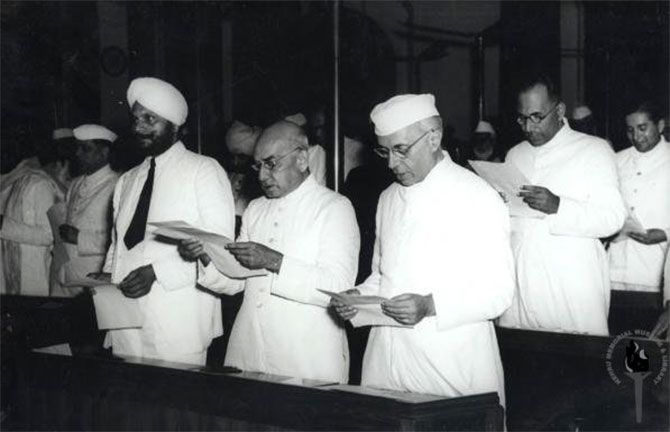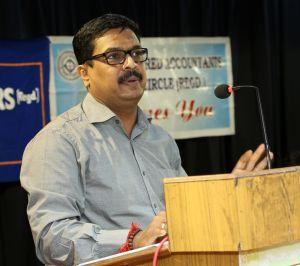'The time has come to have a relook at the Constitution as every document has a shelf life.'

Tamil Nadu Chief Minister M K Stalin has been complaining about the stepmotherly treatment meted out to non-Bharatiya Janata Party-ruled states by the central government, whether it was releasing funds, imposing Hindi through the National Education Policy, sharing GST collections with the states or the impending delimitation exercise.
Stalin has announced the setting up of a panel led by retired Supreme Court Justice Joseph Kurian, to recommend measures to strengthen autonomy for the states.
Interesting times are ahead.
It is against this background that M R Venkatesh, chartered accountant turned advocate, argues that it is time to have a relook at the Constitution in his forthcoming book Discovery of Bharat - Christian Constitution in a Hindu Nation.
"What type of an animal will you get if you combine the hump of a camel, head of an elephant, and throat of a lion? We have to ask ourselves. Who are we? Are we a civilisation of 5,000 to 8,000 years? Have we not governed ourselves 5,000 to 8,000 years ago?" Venkatesh asks Rediff's Shobha Warrier.
27 years ago, in April 1998, after L K Advani spoke about the need for a Constitutional review, there were a lot of debates in the country on why we should review the Constitution.
It was said that the BJP agenda was to move from the Westminster model to the presidential system.
Why do you say the time has come to review, rethink and rewrite the Constitution?
27 years back, the BJP was in power for the first time, but in a coalition.
Because of these limitations, it was a half-hearted attempt at that time, and the review commission ended up in a fiasco. Let's not go into that.
And let me at the outset hasten to add that I have nothing to do with the BJP or any political party. I have written this book as a scholar and not as a political activist.
Today, there are several areas on which we need to ponder. For instance, it was only last month that the Tamil Nadu assembly passed a resolution to form a committee under the chairmanship of Justice Joseph Kurian to look into the federal structure of the Constitution.
After 75 years, we are still asking people to review federalism which is one of the fundamental features of the Constitution. Are we okay with such piecemeal review? If we are, why not a wholesale review?
Let us not forget that the Constitution has been amended 110 times, each time on an ad hoc basis.
But it is said that the Constitution cannot be re-written, it can only be amended...
We are very good in fooling ourselves by saying that we will not rewrite, we will only amend. What is the difference?
We want to engage in an elaborate exercise in semantics and therefore get enmeshed in all kinds of stupidity.
Today, there is a huge war going on between the judiciary and Parliament. Each side is abusing and accusing the other.
And less said about the Executive, the third limb, the better.
At a time like this, any sensible democracy or society will call for a debate. We should not shy away from a debate. Our tradition has been one of continuous debates. We should not shy away from others expressing contrarian opinion.
So, if you are able to convince me that the existing Constitution is excellent, I am ready to agree with you. Provided you are able to look into what I am saying from a neutral perspective, and not a prejudiced perspective.
After that, we can come to a conclusion whether to rewrite the Constitution or not.

What made you say that the time has come to revisit and rethink the Constitution?
I have gone through the entire Constituent Assembly debates, and I have found that there were several contrarian views; some of them very sagacious, some in good faith.
I have listed many ideas that were put forward in the Constituent Assembly debates but ultimately did not find favour in the final draft of the Constitution.
But years later, we can see that we have missed the bus!
Missed the bus?
Yes. For instance, socialism.
Even today, our government thinks that this is a socialist welfare government, and it has the responsibility to cater to every irresponsible citizen.
What do you mean by 'irresponsible citizen'?
Let's assume I have seven children to send to school. But the government believes that it is incumbent on the government to educate the children as if it is not incumbent on the parents to educate their children.
The first fundamental right of a citizen must be to fulfil his fundamental duties.
This came for a debate in the Constituent Assembly. And no less a person than B R Ambedkar said that we should not embark on the socialist pattern of governments. It was his powerful arguments that led to the defeat of Nehru's resolution on socialism.
Again, I am not talking about whether Ambedkar was right or wrong. What I want to say is, the Constituent Assembly had debates on many such issues.
Today, after so many years, our government irrespective of the party, is fast degenerating into a socialist mode, into a welfare mode and into a reckless welfare mode now by handing out Rs 2,000 or Rs 5,000 per month under some yojana or other.
And it is being done in the name of socialism.

You think it will wreck the economy?
It has already wrecked the economy.
It has degenerated society so much that I fear that we may not be in a position to compete with countries like China, Vietnam, Indonesia or Philippines.
By giving money, toddy and some food, the powers that be are telling them, you don't have to do anything, you be at the survival level but vote for me so that I will be in power.
These are structural issues which we need to address, and require serious debates.
And, Ambedkar warned about this 80 years back.
There were debates in the Constituent Assembly on many such issues including, for example, federalism.
My first objection to the Constitution is that it is a cut-copy-paste of the 1935 Government of India Act.
In my book, I have a chapter titled Cut Copy Paste in which I have taken relevant portions of the Constitution and matched them word for word in the Government of India Act.
So, to say that it is an original piece of work is absurd; this is a cut-copy-paste exercise.
It is plagiarism at best! And I am not saying this. Ambedkar himself said in 1948 that this was a plagiarised work, and he was not ashamed of it.
And understand that the 1935 Act was unitary in character.
Then, how did federalism come in this Constitution which was plagiarised?
Because in 1946, we wanted to give the Muslim League an olive branch so that the states will have all the powers except in external affairs, defence and currency. Ultimately the Muslim League did not bite the bait but this was further refined to become federalism as we understand today.
But Gandhi had a different idea of federalism. His idea of federalism was not only swaraj but gram raj along with Ram raj.
Which is decentralisation of power....?
Yes, absolute decentralisation of power.
Is Panchayat Raj not an extension of decentralisation of power?
Exactly. I am coming to that. Stalin talks about decentralisation from Delhi to Chennai.
But does he talk about decentralisation from Chennai to Usilampetti?
The third tier in the Constitution is panchayat raj, and we need to talk about devolution of funds and precise power and responsibilities to the panchayats.
But what are panchayats doing? Is it not part of a larger Constitution 'Federal' structure?
Why can't you give larger power to the panchayats?

During Dr Manmohan Singh's time, the government spoke a lot about giving more power to the panchayats...
This is discussed every year on October 2 on Gandhi Jayanti day but never implemented.
A person like Gandhi had put forward this view but we never cared to implement it.
If you are really sure about panchayat raj, instead of talking about it on October 2, why not shift power from the state governments to panchayat raj?
Then, there has to be devolution of taxes collected. For example, out of the 18% GST, 8% will be shared by the central government, 6% to 7% by the state government and 3% must go to the panchayats.
In this way, you will empower the panchayats.
But we talk about empowering the panchayats only on Gandhi Jayanti day.

You are saying that there should be debates on what exactly federalism is?
Exactly. If you read the entire Constitution, it was basically the 1935 Act and the constitution of 6-7 countries like the US, Britain, France, Germany, Ireland and to some extent Japan.
These are well intended constitutions and stood in good stead for 75 years.
 IMAGE: M R Venkatesh
IMAGE: M R VenkateshIs there anything wrong in picking the good parts from various documents?
True, we should not hesitate to borrow from all sides. I would go to say, let the noble thought come from all sides!
But what type of an animal will you get if you combine the hump of a camel, head of an elephant, and throat of a lion?
We have to ask ourselves. Who are we? Are we a civilisation of 5,000 to 8,000 years? Have we not governed ourselves 5,000 to 8,000 years ago? In a 5,000-year-old civilisation, there may be several things which are bad but there will be several things which are good.
Why can't we take for ourselves the good things?
For example, the Preamble says we are a democratic republic. Democracy as we understand has its roots in Greece and the Republic has its roots with Rome. Both talk about power to the people.
Scholars have chronicled to how in a town like Utharamerur which is closer to Chennai, we had a far greater functional democracy than that of ancient Greece. Why don't we take something from Utharamerur?
Did the Constituent Assembly look at Utharamerur?
No. They only looked at Greece, France or Germany.

You mean, they should have looked within?
They made a conscious effort not to look within. That's why the 1935 Act was plagiarised.
The debate today in India should be whether we are a republic or democracy.
And such a debate will reveal something new in terms of Indian democracy.
We consider ourselves a democracy but in my opinion, we are a republic in the form of democracy.
We need to transfer ourselves from a republican system to a robust democratic system.
It is high time we debate on this.
Today it is easy to criticise the Constitution and say, it's because of Nehru. It is also easy to praise the Constitution and say, it's because of Nehru. I don't want to do either.
I am saying the time has come to have a relook at the document as every document has a shelf life.
It is said that most Constitutions around the world had a lifetime of 19 years.
There is nothing wrong if we rewrite the Constitution. There is nothing sacrosanct about the Constitution.
If you look at history, you will see that some countries have rewritten the Constitution voluntarily, and some countries were forced to rewrite after civil wars.
So, you have a choice.
You can make a course correction before something as catastrophic as a civil war happens.
And civil war need not be on the streets.
What you see today between Parliament and the judiciary, between the Centre and the states is also civil war, and it is very uncivil.
Feature Presentation: Aslam Hunani/Rediff.com







